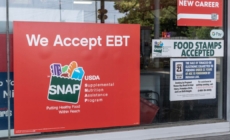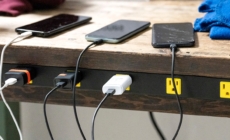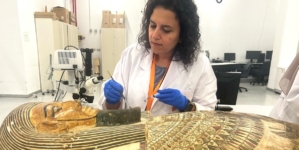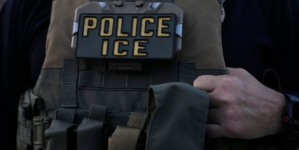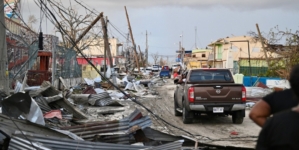-
Half of Americans Don’t Know This Common Habit Increases Cancer Risk - 2 mins ago
-
SNAP funding is set to lapse Nov. 1, leaving recipients empty-handed. Here’s what experts say. - 9 mins ago
-
Viktor Orbán’s Allies and Opponents Deadlocked in Dutch Parliamentary Elections - 11 mins ago
-
Park rangers bring nature to preschoolers amid government shutdown - 38 mins ago
-
Rescue Cat Loses His Ears and Tail to Frostbite, Then Couple Visit Shelter - 42 mins ago
-
Hungarian Tourists Involved in the Nile Boat Accident are Well, Says Foreign Minister - 45 mins ago
-
Simple tweaks to stop your phone battery from dying quickly every day - 52 mins ago
-
Former Napoli and Italy Coach Luciano Spalletti Finalizing Deal at Juventus - about 1 hour ago
-
King Tut’s treasures haven’t been all together in more than a century. Until now. - about 1 hour ago
-
What makes a rebellion? Trump troop deployment may hinge on definition - about 1 hour ago
Inside a high-security Chinese factory pumping out fentanyl
YICHANG, China — Behind a large glass wall, a worker in full protective gear watches as hundreds of tiny glass bottles whizz by every minute, sterilized, filled and packaged by a ballet of robotic arms.
Inside each ampule is the substance at the heart of the geopolitical strife between the United States and China: fentanyl, the deadly opioid set to be top of the agenda when Presidents Donald Trump and Xi Jinping meet Thursday.
NBC News got exclusive access to the headquarters of Yichang Humanwell Pharmaceutical, the largest producer of the drug in China, and indeed Asia, at its sprawling complex in the central city of Yichang.
Humanwell says that it only supplies fentanyl for use in hospitals and that it does not export any medication to the United States, Mexico or Canada. In 51 years of operating, “we have never had a single incident of a drug going missing — not a single dose has ever been lost,” its president, Du Wentao, said in an interview inside his factory, which is surrounded by high fences wrapped in concertina wire and electric sensors.
Read more on this story at NBCNews.com and watch “NBC Nightly News with Tom Llamas” tonight at 6:30 p.m. ET/5:30 p.m. CT.
Humanwell Healthcare is one of only five companies in China licensed to produce fentanyl for use in hospitals, and it makes around 100 million doses of fentanyl variants each year.
After a strict registration process to get past the main gate, all visitors and staff alike — including the CEO — are required to wear blue hospital caps, shoe covers and lab coats to ensure they do not contaminate the workspace.
Most of the production line is automated to limit human contact, with the vials being washed and sterilized and then filled with fentanyl using long rubber tubes.
Two staffers in protective gear supervised the process, with an alarm pinging every 10 minutes to remind them to spray their gloved hands with disinfectant. The vials are then inspected using flashes of light, stamped, boxed up and shipped out via a warehouse.
Trump says fentanyl will be the subject of the “first question” he asks when he meets with Xi in South Korea, the last stop of his three-country Asian tour.
American officials say the Chinese government hasn’t done enough to stem the illicit international flow of precursor chemicals for fentanyl, which are then processed into the highly addictive opioid in Mexican labs and smuggled across the border to the United States. Though deaths appear to be declining in the U.S., fentanyl and other synthetic opioids have killed hundreds of thousands of Americans in recent years, according to the Centers for Disease Control and Prevention.
Trump, who cited fentanyl as the reason for imposing the first 20% in tariffs on China since retaking office in January, said Wednesday that he believed China is “going to help us with the fentanyl situation” and that tariffs would be lowered accordingly.
China has defended its anti-fentanyl efforts and says unrelenting American demand for the drug is to blame for the crisis.
But a State Department report to Congress last month accused the ruling Chinese Communist Party of continuing to “subsidize and otherwise incentivize China-based companies to export synthetic drug precursors, including through tax rebates, monetary grants and awards, and official site visits.” It accused companies controlled by the Communist Party of being “complicit in this illicit trade.”
Under pressure from Trump, China made fentanyl a controlled substance in 2019, banning its use outside of medical prescriptions. That slowed the influx of Chinese fentanyl into the U.S., but the “prolific export of chemical precursors and other illicit narcotics remains,” the State Department report said.
Chinese officials reject that narrative.
“China expresses sympathy for the American people suffering from the fentanyl crisis,” Foreign Ministry spokesperson Guo Jiakun told reporters in Beijing on Wednesday.
But he added that “China is the country most resolute in drug control, with the most comprehensive policies and the best track record. It is also one of the countries with the largest number of controlled substances and the strictest regulations in the world.”
Du, the president of Humanwell Healthcare, which produces 100 million doses annually of fentanyl-based products, says that the meticulously clean, automated and controlled operation observed by NBC News was no facade.
“The management of fentanyl drugs in China is among the strictest in the world,” he said. “There is absolutely no possibility that any dose from our company has flowed to the United States. I can state this with full confidence and certainty — there is no issue whatsoever.”
He derided the “many statements in the U.S. claiming that the fentanyl crisis originates from China,” saying that is impossible “given how strict our controls are.”
As well as the visit to Humanwell, NBC News gained exclusive access to the National Narcotics Intelligence Center in Beijing, which had been sanctioned by Washington in 2020 but saw those measures lifted three years later during the Biden administration as the two countries agreed to resume cooperation on fentanyl.
There, Chinese security officials said the two sides are again exchanging information on how smugglers alter their tactics.
Fentanyl precursors are “indeed one of our main concerns because drug synthesis techniques and methods are constantly evolving,” lab director Hua Zhendong told NBC News.
“We have not found such processing plants domestically,” he said, so “most of the relevant information comes from technical exchanges with U.S. counterparts.”
Hua said the latest precursor chemicals identified by the U.S. “are added to our monitoring list so we can strengthen our attention to these substances.”
He said that banning all fentanyl products outside medical use in 2019 had “effectively curbed illegal production and trafficking.”
U.S. officials say that’s not the case. The extent to which Washington and Beijing can find common ground on the issue is likely to influence the result of Trump and Xi’s meeting this week, though experts say halting the illicit flow of fentanyl components is easier said than done
“I think there is an assumption here that if the Chinese really wanted to shut off these precursors, they could do it,” said Michael Swaine, a senior research fellow in the East Asia Program at the Quincy Institute for Responsible Statecraft, a Washington-based think tank.
The problem, he said, is that there is no “set number” of precursors to fentanyl.
“You don’t have a clear list of specific items that you would be able to easily interdict,” Swaine said. “And a lot of them, of course, are very dual-use items.”
So while there might be a “symbolic effort” to deal with the fentanyl issue at the Trump-Xi meeting, he said, “I don’t think that this is going to go completely away.”
Source link

